Conservative Education–Part 4: Does Charity Begin at Home? Or with Saints? (Or What Do We Do in a World Where Our Heroes Have Become Entrepreneurs? And Not Even Cowboys?)

This will be my last post on conservative education at the ISI Honors Program.
A couple of people have written me (doubtless Canadians) complaining that I distorted the thought of the great Canadian thinker George Grant. Grant, later in life, found inspiration in the French saint Simone Weil, who died in 1943 at 34. Grant lost interest in the philosophers Strauss and Heidegger as soon as he came to the conclusion that they couldn’t teach him what he most needed to know.
That’s a good criticism. My response in that once Grant turned to Weil, he went beyond the confines of the Canadian tradition and even beyond the realm of political thinking as it’s generally understood.
Weil, it’s claimed, died out of love–meaning a love of other persons out of love of God. She was one one the 20th century’s geniuses–a philospher, a mathematician, a mystic. She was born in an agnostic Jewish family, had a couple of deeply personal revelations of God love, became a deeper believer in at least most of what the Catholic Church teaches about the personal, loving, relational God and the human good, but may well have never been baptized a Catholic. She taught that most of the world’s greatest religions taught much of the truth, but she wasn’t for some kind of synthesis that incorporated all of them. That would reduce each of them to less than what it is; each religion, like each human person, has to be approached as a whole.
Weil was also for the spiritualization of work. And when she wrote about the irreducible needs of the human soul, she meant both bodily needs and spiritual ones. She was a pacifist, but she fought (ineptly) on the republican side in the Spanish Civil War and in the French Resistance against Hitler. She felt so strongly both the joy of love and suffering of her fellow persons that she certainly neglected the needs of her body, but not out of some illusion that her body wasn’t part of her.
What Grant took from Weil, above all, is that the highest virtue is charity. It is, in a way, a supernatural virtue. But it flows not only from God’s revelation but from a deep analysis of who each of us really is.
Weil’s philosophy is strikingly original but deeply Platonic–some say, including Grant, even gnostic. She thought that in order to create the world God had to make himself absent. But this largely chance-and-necessity world points beyond itself in the direction of its Creator. Even or especially geometry, she explained in a Platonic way, does so. Thinking of the world in terms of the incomplete absence of God should remind us of the great Christian mathematician/philosopher Pascal. But Weil, far more than Pascal, was really all about the love, all about charity. (Pascal was more about our miserable anxiety–or extreme personal contingency–in the absence of God. Pascal thought himself to death, Tocqueville observed, before he was forty; Weil died young for a somewhat different reason.)
As it happens, one of our speakers at the conference criticized our founding philosopher, John Locke, from the point of view of Weil. This guy is the laconic, bookish type–a graduate of the Great Books St. Johns College and a comparable Ph.D program at the University of Chicago.
What’s wrong with Locke, in his opinion, is that he tried to separate our natural experience experience of liberty from both justice and love. According to our Locke, our deepest experience isn’t relational, which means it’s selfish and lonely. The deepest form of poverty, Christian charity suggests, is loneliness. So the foundation of our government doesn’t do justice to either the true needs of the body or the more specifically spiritual needs of our soul. We can’t learn about the spiritualization of work from Locke, and so for him work becomes something we can work ourselves out of through techno-progress. So we can say that the Americans became in some ways richer and in other ways poorer than ever.
A Lockean might respond, of course, that any attempt to politicize love and charity leads to tyranny. Charity is personal, not political. It might be good to have a civilization of love, which we don’t. But there’s no political route to that goal.
But the man inspired by Weil says that our political order might be more personal and so more local–or less techno-cosmopolitan and impersonal. Weil herself wrote a lot about the French need for roots in thinking about their social and political life after the Nazis are defeated. Her words inspired the tough or rather stoic existentialist Camus, but bored the heroic French re-founder General Charles de Gaulle.
The least we can say in criticism of our time is that we’re too rarely inspired by saints and heroes–by lives wholly devoted to charity or extraordinary courage–because we think that what motivated saints and heroes is some kind of dangerous insanity. But the real point of the study of Great Books is to keep the experience of saints and heroes–and philosophers and poets who could do justice to saints and heroes–alive in our techno-time.





